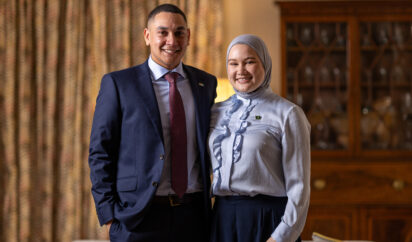News
A conversation with Fiona Jose
Fiona Jose is a Roberta Sykes Bursary Alumna and the CEO of Cape York Partnership, an Indigenous organisation driving a comprehensive reform agenda improving the lives of Indigenous families in the Cape York region. We chatted with Fiona about her time overseas and the importance of staying connected to community.
You attended the Authentic Leadership Development course at Harvard Business School in 2015 as a Roberta Sykes bursary recipient. What impact did this have on you personally and your career?
I understood that it was a terrific opportunity, but I felt small in this big opportunity. The experience and connection made me realise how important and big the work we were doing was in the bigger scheme. We were all there to learn more about social impact, more than making money or running and growing a vibrant business nonetheless I was intimidated and shy to talk about my role as ‘I just work for an Indigenous organisation’. I wasn’t expecting that this would be met by admiration, sentiment back home was very different. So, I was challenged about why am I reluctant or nervous about it. Other leaders on the course said they didn’t know that they could do it, that making money was easy but working on a comprehensive reform agenda to truly improve the lives of people entrenched in poverty, disadvantage, and failed government policy was ‘a lot’ and something I should be proud of. This gave me confidence, strength, and faith in my passion (and that of my organisation) and ability, and perspective. Not everyone wanted to do this work or could. I was very firm and clear in my vision and goals and that I wanted to strongly influence the work and lead. The Harvard experience helped cement in my heart and mind my value proposition to this work and as a leader. I now lead the organisation and reflect often on this opportunity in 2015.
We talk about the benefits of keeping connected to community. What does this mean to you and why is it important?
The voice of our communities guides everything we do. My connection with our communities at various levels is critical to our empowerment work. We cannot truly empower without walking beside and behind. Our methodology is anchored in co-creation, co-designing policy and implementation solutions with local residents in communities, with many voices of experience and agency, as this is the only way we will build truly connective solutions that have any chance of success. CONNECTION is everything when it comes to an empowerment agenda.
What advice do you have for students who might be studying away from home to stay connected to community?
Staying connected supports your own wellbeing and those you leave behind – our devices make it very easy these days – but going away and learning new things helps perspective. Orbiting is a massive personal mantra – ‘From Cape York to New York’ – we must learn to live in two worlds, and walk in, and be connected in both. Our goal is for our people to be comfortable and confident to flourish in two worlds, “From Cape York to New York” is about being strong in self and identity and carrying that with you wherever in the world you go.
Cape York Partnerships and Aurora both focus on Indigenous leadership. What role do you see emerging Indigenous leaders having?
They are the future. We expect that leaders call for change – but real leaders ARE change. “Emerging leaders” is a bit of a weird term. Is there the ‘coming out’ of a leader? I’m not sure. I think a leader is a leader – a leader in a family, a small group, but often leaders are visible in a larger group, these are the ones who become recognised or heard. Whether a small or large group they are a leader. I don’t think you are a Leader (capital ‘L’) only when you are publicly visible. Leaders, emerging or otherwise, model behaviour and change in their homes, in their families, in their workplaces. To answer your question though, ‘emerging leaders’ have the power to create a ripple effect on those around them whether in their local community or to greater scale. Our young ones can only be what they can see. Emerging leaders provide hope and aspiration and educate on new perspectives. They provide new connections where there may be gaps and absolutely need to be supported and nurtured, to stay focussed and strong over the longer term. Leadership can be tough.
What do you recommend young Indigenous people do to build or strengthen a network around themselves?
Pick a cause you are passionate about; it may not be your absolute calling, but you will find it this way. You will find mentors, like-minded people, grow skills and confidence and you might even have fun along the way. There is nothing more rewarding than playing a role in positive change then watching, supporting, even empowering that to grow and evolve.
Is there anything else you would like to add on our topic of ‘Staying connected to community’?
Staying connected can be hard work and something you must commit time and energy to but will bring enriched outcomes personally, professionally and positively impact others. It is hard. But we can do hard things! Just know there is so much out there, you never know what is going to happen, and connection can make things happen. It’s never too late to chase dreams and meet heroes and be who you want to be. And for those who feel like they have made it, congratulations! Soak it up but pay it forward. You might one day be the hero in someone’s story.
